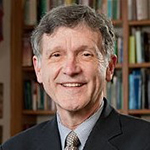 By Bill Leonard
By Bill Leonard
Sometimes I think I’d love a good mystical vision, when God told me exactly what is right and wrong; how to believe and behave. Surely then I could sort out all the theological and ethical dilemmas of human existence. Yet I’m not sure I could handle such divine encounters like those experienced by Moses, Ezekiel and Daniel, or Sts. Paul, John, or Teresa of Avila. Having a vision is one thing; discerning its meaning quite another. Today, one person’s vision is another’s hallucination. Visions are scary; they can bring new insights or make us crazy.
These days I keep returning to the story of Simon Peter’s grand vision described in Acts chapter 11; when the fledgling church was trying to discern what it was and what it wasn’t. Maybe you need a good vision when you’re starting something new; or when you don’t know who you are; or when you can’t decide who is out and who is in.
Such a vision couldn’t hurt American Christianity, what with so much public “othering” of Muslims and Mexicans, gays and strays, socialists and tea-partiers, evangelical-fundamentalists and secular-humanists. This election year we seem obsessed with us against them; we just can’t agree on who “they” are or which “us” is us.
The earliest Christians were similarly afflicted. Acts 11:1 says: “Now the apostles and the believers who were in Judea heard that the Gentiles had also accepted the word of God.” Apparently the genuine “believers” hadn’t counted on the possibility that the “Good News” would work on “those people.” Race, belief and biology were inseparable and controversial from the beginning.
So Simon Peter arrived in Jerusalem, and “the circumcised believers criticized him, saying ‘Why did you go to the uncircumcised men and eat with them?’” The church of Jesus Christ is about 15 minutes old and the “believers” are fighting about race and ethnicity; orthodoxy and theology; sexuality and food. (Just try to tell me they weren’t Baptists!) Some unexpected people “accepted the word of God” and the “apostles and the [real] believers” aren’t sure they should let them into their new tribe, you know, the “body of Christ.” The earliest Christians had a vision of a new community but already they wanted to limit its boundaries.
So, Acts tells us, Simon Peter has to “explain it to them, step by step.” Some people see visions; the rest of us need step by step explanations. “I had this vision,” Peter says, “in a trance.” Already we academic-rationalist-types are dubious. We’re not big on trances.
A large sheet descends, with an irregular menagerie of “four-footed animals (remember the “cloven-hoof” animals?), beasts of prey (lions and tigers and bears?), reptiles (my serpent-handling friends love this vision!), and birds of the air (probably pigeons, they show up everywhere).
Suddenly the “Prince of Apostles” is told: “Get up Peter, kill and eat; satisfy your hunger with God’ gifts.” But Peter demurs: “By no means, Lord.” Dietary practices die hard, especially when linked to spirituality. (I’ve known vegans who would have said the same thing.) Then comes the lesson: “What God has made clean, you must not call profane.” It took “three times” before “everything was pulled up again to heaven.” Peter finally caught on.
Immediately three men from Caesarea show up asking for help and Peter’s response seems more Pentecostal than Papal. “The Spirit told me to go with them and not to make a distinction between them and us.” At the intersection of grace and gospel, THERE IS NO THEM. “They” and “we” have become US!
This revelation, this vision, does not mean that there aren’t differences between human beings of multiple “tribes,” contexts, gender or race; it means there are no distinctions when it comes to grace.
Perhaps Peter’s realization that there is no “distinction between them and us” marks the real beginning of the Church. It doesn’t mean that we do not disagree; or that all our consciences meld into one. Nor does it require us to parrot the same liturgies, eating practices, dogmas, or social imperatives. It does not abolish differences of culture and context, gender and race. Rather, it means that we can’t let those things keep “us” or “them” from grace.
We’ve tried it before, remember? “If we evangelize the slaves, they may think they are as free as we are.” “If we abolish Jim Crow laws, they’ll want to marry OUR people.” “If women get ordained, we’ll all lose our place in the Divine scheme of things.” “If we eat with them, we might have to be friends,” thus Simon Peter opened the door to Gentile inclusion in the church. Paul, in turn, kicked it down, with that radical, yet unrealized assertion: “In Christ there is neither Jew nor Greek; slave or free, male or female.” In Christ all those “thems” became “us.”
Peter summed it up, “If God gave THEM the same gift God gave us — Jesus Christ — who was I to hinder God?” But Jesus said it better: “By this everyone will know that you are my disciples, if you love one another.” That’s a lot to ask of you and me; of them and us. But it’s who we ALL are, really, by grace.
